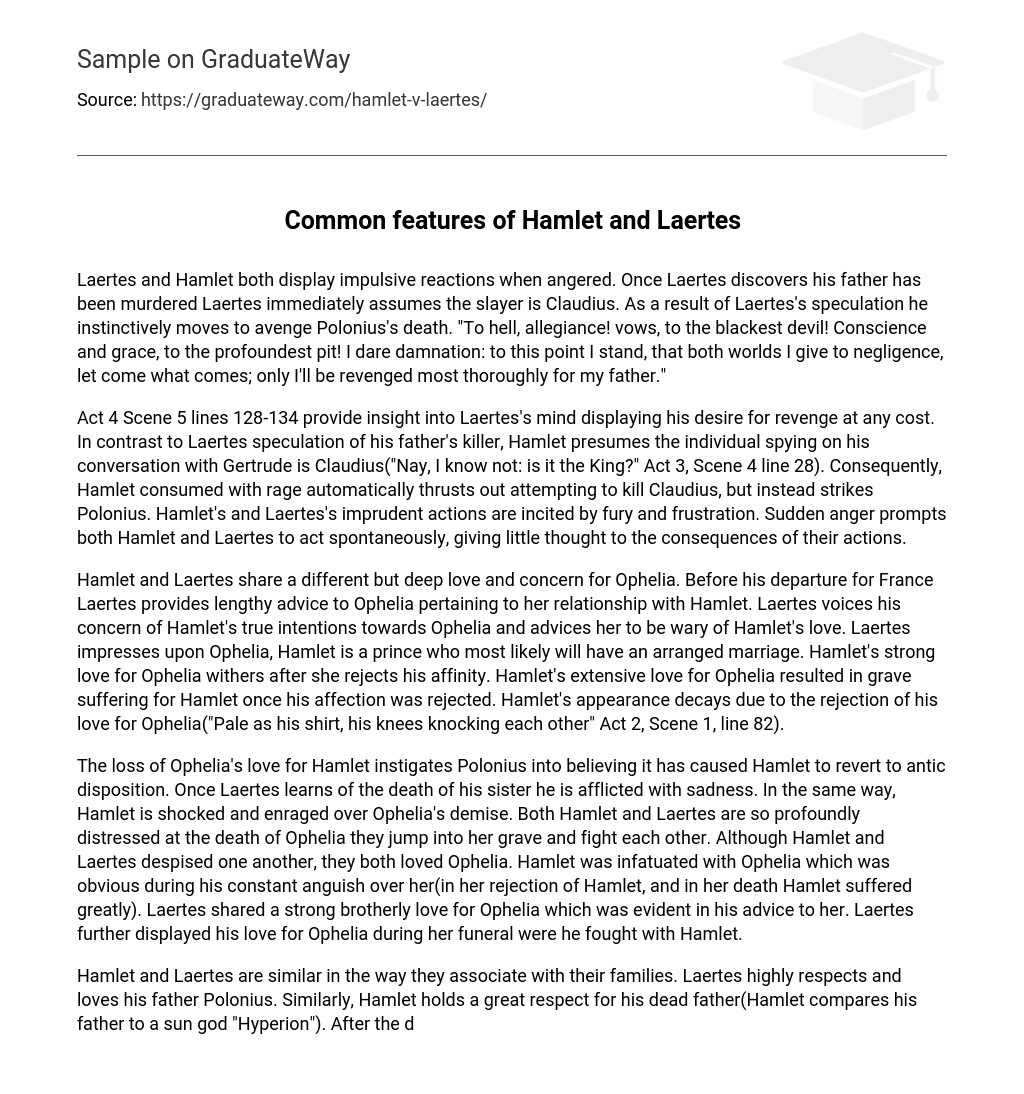Both Laertes and Hamlet demonstrate impulsive reactions when provoked. Upon learning of his father’s murder, Laertes quickly jumps to the conclusion that Claudius is the culprit. Consequently, Laertes instantly takes action to avenge Polonius’s death. “To hell with loyalty and promises! I reject all conscience and grace, offering my soul to damnation. I am willing to disregard everything else just to seek thorough revenge for my father.”
Act 4 Scene 5 lines 128-134 provide insight into Laertes’s mind, revealing his strong desire for revenge regardless of the cost. On the other hand, when Hamlet suspects someone eavesdropping on his conversation with Gertrude, he assumes it to be Claudius (“Nay, I know not: is it the King?” Act 3, Scene 4 line 28). Consequently, consumed by anger, Hamlet impulsively attempts to kill Claudius but ends up striking Polonius instead. Both Hamlet and Laertes act recklessly driven by fury and frustration. Their sudden bursts of rage prompt them to act without considering the consequences of their actions.
Hamlet and Laertes both have strong feelings of love and concern for Ophelia, although their perspectives differ. Before leaving for France, Laertes offers lengthy advice to Ophelia regarding her relationship with Hamlet. He expresses his worry about Hamlet’s true intentions towards Ophelia and advises her to be cautious about his affection. Laertes emphasizes that Hamlet, being a prince, is likely to have an arranged marriage. After Ophelia rejects his love, Hamlet’s intense affection for her diminishes. The rejection of his love causes Hamlet immense suffering, leading to the deterioration of his appearance (“Pale as his shirt, his knees knocking each other” Act 2, Scene 1, line 82).
The loss of Ophelia’s love for Hamlet leads Polonius to believe it has caused Hamlet to pretend to be insane. When Laertes hears of his sister’s death, he becomes very sad. Similarly, Hamlet is shocked and angered by Ophelia’s death. Both Hamlet and Laertes are so devastated by Ophelia’s death that they jump into her grave and fight each other. Although Hamlet and Laertes disliked each other, they both loved Ophelia. Hamlet was deeply infatuated with Ophelia, which was clear in his constant anguish caused by her rejection and her subsequent death. Laertes had a strong brotherly affection for Ophelia, which was evident in his advice to her. Laertes further displayed his love for Ophelia at her funeral when he fought with Hamlet.
Hamlet and Laertes both have strong family bonds. Laertes deeply loves and respects his father, Polonius, while Hamlet greatly admires his deceased father whom he compares to a sun god called “Hyperion”. After their fathers are killed, both Hamlet and Laertes seek revenge against the murderers. Additionally, both Hamlet and Laertes display controlling behaviors towards women. Laertes advises his sister Ophelia on her relationship with Hamlet, while Hamlet manipulates his mother Gertrude into believing he is not insane and convinces her to do as he instructs.
Hamlet tells his mother to persuade Claudius of his madness. Through his words, Hamlet forces his mother to reflect on her role in his father’s death and experience guilt (“Thou turn’st mine eyes into my very soul, and there I see such black and grained spots as will not leave their tinct.” Act 3, Scene 4 lines 90-93). Additionally, Hamlet warns his mother against sleeping with Claudius. Both Laertes’ and Hamlet’s fathers attempted to gather information on their sons through spies (while Claudius was not Hamlet’s biological father, he was both his uncle and step-father). Claudius employed Rosencrantz and Guildenstern to gather information on Hamlet, while Polonius sent Reynaldo to check on Laertes. Hamlet and Laertes share similar familial circumstances.
Both Hamlet and Laertes exhibit impulsive actions when angry. Hamlet becomes enraged when he discovers that Claudius has been spying on him, leading to Hamlet accidentally killing Polonius. Similarly, Laertes is consumed with fury over the death of his father and aggressively seeks revenge against Claudius. Their temporary anger drives both Laertes and Hamlet to act without thinking. Additionally, both Hamlet and Laertes share a deep affection for Ophelia.
Hamlet’s profound affection for Ophelia becomes apparent through his response to her refusal of him, while Laertes’ concern and fondness are exposed through his guidance to his sister. The families of Laertes and Hamlet possess similar qualities. Hamlet and Laertes possess a strong admiration for their fathers and are willing to go as far as murdering the king in order to seek revenge. Both characters exhibit a dominant attitude toward women. To sum up, despite being enemies, Hamlet and Laertes have numerous shared attributes that render them alike.





